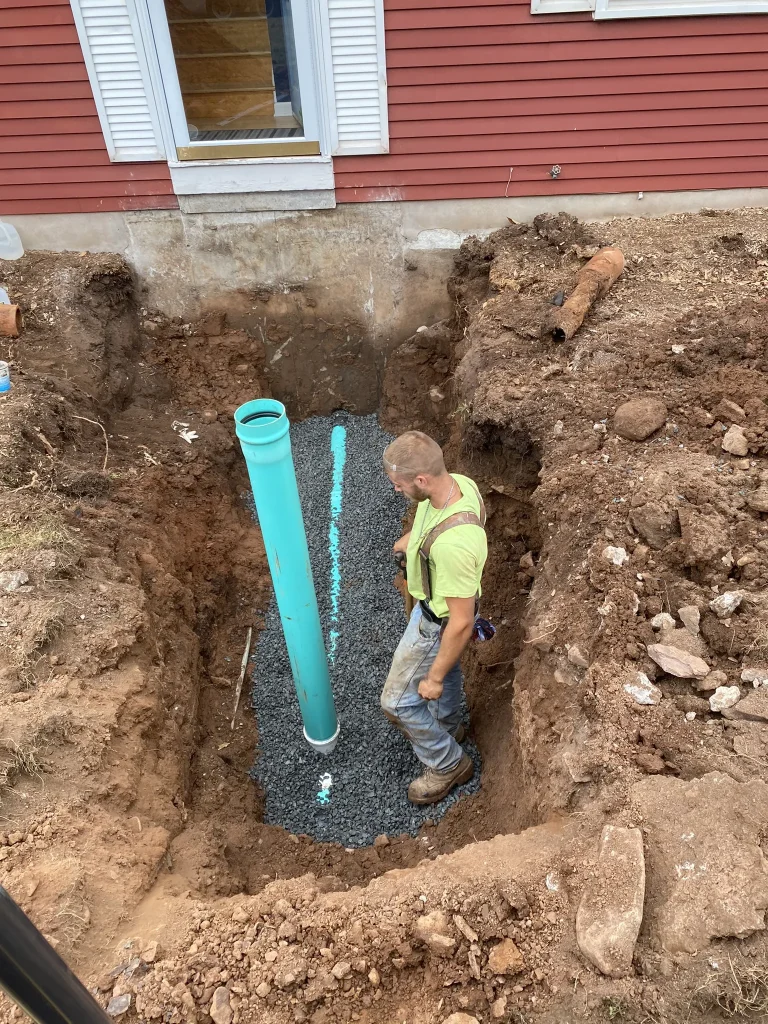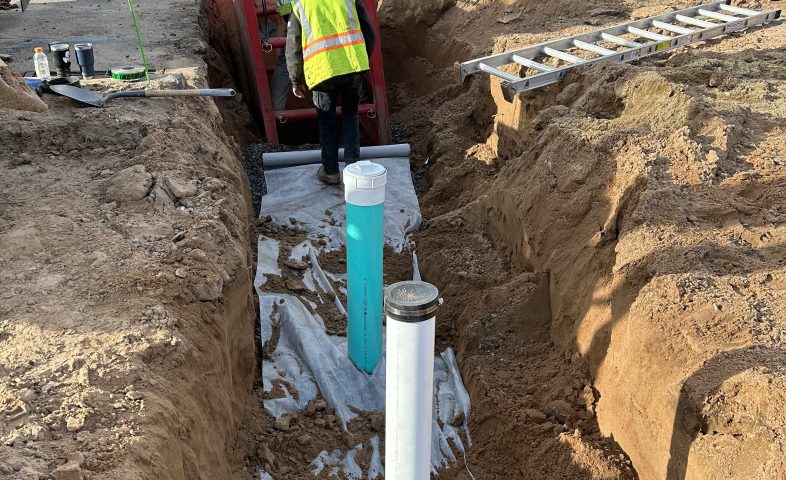Why Connecticut Homeowners Need to Know About Sewer Line Replacement
Picture this: You’re hosting a family gathering when suddenly your toilets start backing up, drains won’t clear and there’s a sewage smell throughout your home. For homeowners in Plainville, Bristol, New Britain or Southington, this nightmare scenario might signal that your sewer line is failing.
Connecticut homes, particularly those built before the 1980s, often have aging sewer lines made from clay or cast iron that weren’t designed to last forever. Our region’s freeze-thaw cycles, mature tree growth and shifting soil accelerate deterioration, leading to cracks and blockages that drain cleaning can’t fix.
This guide covers everything you need to know about sewer line replacement – from recognizing warning signs to choosing the right contractor. If you’re experiencing sewer issues now, our team provides expert sewer excavation services throughout central Connecticut.

Warning Signs Your Sewer Line Needs Replacement
Multiple Drain Backups – Simultaneous backups in multiple fixtures – especially lower-level drains and toilets – often indicate main sewer line problems rather than isolated clogs.
Persistent Sewage Odors – Sewer gas smells in your yard or basement signal cracks or breaks in your line. A properly functioning sewer line is airtight.
Soggy Spots or Lush Grass Patches – Areas that stay wet during dry weather or unusually green grass indicate leaking wastewater saturating your soil.
Gurgling Sounds – Strange noises when flushing toilets or running water suggest trapped air due to blockages or breaks.
Frequent Clogs – If professional cleaning only provides temporary relief, structural damage likely requires more than cleaning.
Age and Pipe Material – Homes over 40 years old with original clay or cast iron pipes often need replacement. Clay cracks easily while cast iron corrodes.
Tree Root Intrusion – Mature trees seek water sources and can infiltrate cracks, eventually crushing or blocking pipes completely.
If you’re experiencing these warning signs, get a professional assessment quickly. Sewer excavation contractors in Plainville can diagnose whether you need repair or full replacement.
Understanding Sewer Line Replacement Methods
Traditional Excavation Method
Traditional excavation involves digging a trench from your home to the sewer connection, removing old pipe, and installing a completely new line. Professional sewer excavation contractors in Bristol use specialized equipment to dig 3-6 feet deep depending on local codes.
This method is necessary when pipes have extensive damage, have collapsed or need rerouting. Benefits include complete visual access to identify additional issues, a fresh start with 50+ year lifespan and modern PVC or HDPE pipes that resist root intrusion and corrosion.
Connecticut’s frost line requires pipes buried 3-4 feet deep per the Connecticut State Building Code. Our region’s varied soil conditions – from rocky ledge to heavy clay – affect excavation complexity, making local contractor experience valuable.
Trenchless Methods
Trenchless replacement offers less invasive alternatives. Pipe bursting pulls new pipe through old pipe while breaking apart the damaged line. Pipe lining (CIPP) inserts a resin liner that cures to create a new pipe inside the old one.
These work best when existing pipe pathways are sound with minor damage and when avoiding disruption to landscaping or hardscaping is priority. However, collapsed pipes, severe deterioration or needed rerouting require traditional excavation. Experienced sewer excavation contractors in New Britain can evaluate which approach suits your situation.
The best method depends on damage extent, location, pipe condition and local codes. A thorough inspection and professional recommendations ensure you choose the right approach.
The Sewer Line Replacement Process: What to Expect
Initial Inspection and Assessment
Video camera inspection identifies exact damage location and extent. You must contact Connecticut 811 at least two business days before excavation to mark underground utilities. Your contractor obtains necessary municipal permits.
Excavation and Installation
Work typically takes 1-3 days for most residential projects. After marking the work area, contractors excavate, remove old pipe and install new PVC or HDPE pipe with proper 1/4 inch per foot slope. The trench is backfilled in compacted layers to prevent settling.
Final Inspection and Restoration
Municipal inspectors verify code compliance before completion. Your contractor restores and reseeds affected lawn areas. Most projects take 3-5 days from start to finish, depending on complexity and weather.
How to Choose the Right Sewer Line Contractor in Connecticut
Verify proper licensing and insurance through the Connecticut Department of Consumer Protection. Look for specific sewer excavation experience, not just general excavation work.
Local contractors understand regional soil conditions, municipal codes and permit processes in Plainville, Bristol, New Britain and Southington. Check references from recent sewer projects and ask to see examples of completed work. Sewer excavation contractors in Southington with established local reputations can demonstrate their expertise through past projects.
Ensure contractors have proper equipment, offer meaningful warranties covering materials and labor, communicate transparently and provide emergency availability. Don’t choose based solely on price – experienced, licensed contractors with good references provide better long-term value.
Protecting Your Investment: Sewer Line Maintenance Tips
Never flush anything except human waste and toilet paper. “Flushable” wipes, feminine products and paper towels cause blockages. Don’t pour grease or oils down drains.
Schedule professional video inspections every 3-5 years to catch minor issues early. Plant trees at least 10 feet from sewer lines, avoiding fast-growing species with aggressive roots like willows and silver maples. Consider root barriers for added protection.
Stay alert for warning signs like slow drains or gurgling sounds. Proactive maintenance extends your sewer system’s life and prevents costly emergencies. Professional sewer excavation contractors can perform routine inspections to catch problems early.
Get Expert Sewer Line Replacement in Plainville and Surrounding Areas
Your sewer line is critical infrastructure you don’t think about – until something goes wrong. At Valley View Excavating, we’ve served Plainville, Bristol, New Britain and Southington homeowners for years with professional excavation and sewer services.
We specialize in both traditional excavation and trenchless methods, handling everything from initial inspection and permits to final landscaping restoration. We work efficiently to minimize disruption while maintaining quality workmanship that protects your home for decades.
Don’t let sewer problems escalate into emergencies. Early intervention saves money and prevents property damage.
Contact Valley View Excavating today for a professional assessment and free estimate. Call (860) 559-4977 to schedule your consultation with Plainville’s trusted sewer line replacement experts.

